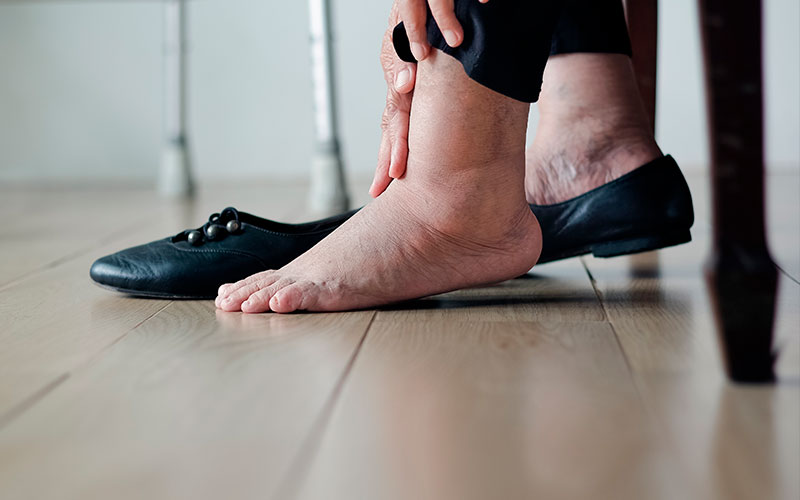Neuropathy
Peripheral neuropathy is a condition caused by nerve damage in the body, which causes pain, weakness, and numbness in the feet (as well as the hands and other areas of the body.)

What causes peripheral neuropathy?
Peripheral neuropathy is not a disease but rather the name given to nerve damage of the peripheral nervous system. If you have a family history of peripheral neuropathy, you are more likely to develop the disorder. Nerve damage caused by diabetes is one of the most common forms of the disorder leading to numbness, pain, and loss of feeling in your hands and feet. There is also an increased risk of neuropathy if you have high blood pressure, are over the age of 40, or are overweight.
There are many health conditions that can cause peripheral neuropathy, including:
- Diabetes, many people with diabetes develop neuropathy.
- Hereditary disorders, such as Charcot-Marie-Tooth disease.
- Autoimmune diseases, such as lupus, rheumatoid arthritis, and Guillain-Barre syndrome.
- Tumors, both benign and malignant growths, can develop on or press onto the nerves. Additionally, cancers related to the immune system can result in polyneuropathy.
- Infections, both viral and bacterial infections including Lyme disease, shingles HIV, and Epstein-Barr.
- Bone marrow disorders, including monoclonal gammopathies, myeloma, and lymphoma.
- Other diseases, including kidney and liver disease, hypothyroidism, and connective tissue disorders.
- Other causes, including alcoholism, exposure to poisons, certain medications, trauma as a result of an accident or injury, and vitamin deficiencies.
- Idiopathic neuropathy, where the cause of the condition remains unknown.
What are the symptoms of neuropathy?
There are three types of peripheral nerves: sensory nerves, motor nerves, and autonomic nerves, and peripheral neuropathy can affect one group of nerves or all three.
Symptoms include:
- Tingling in the hands or feet
- Constriction in the hands or feet (like you’re wearing a tight glove or sock)
- Sharp pains
- Numbness or buzzing sensation in the hands or feet
- Weakness or heaviness in the arms or legs
- Loss of fine motor control
- Lower blood pressure
These symptoms may indicate another condition, so when consulting with a doctor, it is important to cover all your symptoms in detail for an accurate diagnosis.
When should you see a doctor?
If you experience any ongoing tingling, pain, or noticeable weakness in your hands or feet, you should immediately seek a professional opinion. Early diagnosis and intervention will offer you the best chance of controlling your symptoms and preventing further damage if you have neuropathy.
A doctor that specializes in foot and ankle conditions can help confirm a neuropathy diagnosis with a physical and neurological exam and a discussion of your medical history. Additional tests may include:
- Blood and urine tests
- CT scan or MRI
- Nerve and muscle biopsies
- Nerve conduction study
- Electromyography
- Spinal tap or lumbar puncture
What treatments are available?
As neuropathy is caused by an underlying condition, the treatment will depend on that disorder which may mean controlling blood glucose if diabetes is the cause, or correcting an identified vitamin imbalance. Your treatment will be personalized to match what you need, including:
- Over the counter pain and inflammation medication
- Prescription medication
- Plasmapheresis to remove problematic antibodies from your blood
- Transcutaneous electronic nerve stimulation (TENS)
Where neuropathy affects your feet, a doctor who specializes in foot and ankle ailments will also help you to make adjustments to improve your lifestyle and decrease the risk of accidents at home, such as:
- Ergonomic casts or splints to provide support and relieve discomfort
- Removing trip hazards
- Wearing shoes to protect your feet
- Installation of handrails
Get help from our team of professionals
A neuropathy diagnosis can be treated and managed with the right care. Our multi-medical practice doctors have specialized experience that will support a correct diagnosis as well as offering treatment interventions to manage the condition and improve your quality of life. To get in touch, please give us a call on 847-885-9525 or request an appointment through the website.